 India's next prime minister, Narendra Modi, greets supporters at his mother's home in Gandhinagar on Friday, May 16. Modi is the leader of the Hindu nationalist Bharatiya Janata Party, or BJP. After a five-week-long election, the BJP swept the ruling Indian National Congress from power. Official results were expected later Friday.
India's next prime minister, Narendra Modi, greets supporters at his mother's home in Gandhinagar on Friday, May 16. Modi is the leader of the Hindu nationalist Bharatiya Janata Party, or BJP. After a five-week-long election, the BJP swept the ruling Indian National Congress from power. Official results were expected later Friday.  BJP supporters dance and set off firecrackers at the news of election results in Allahabad on May 16.
BJP supporters dance and set off firecrackers at the news of election results in Allahabad on May 16.  Supporters celebrate the opposition's victory in early preliminary results in Guwahati on May 16.
Supporters celebrate the opposition's victory in early preliminary results in Guwahati on May 16.  Sonia Gandhi, leader of the Indian National Congress, addresses reporters May 16 outside party headquarters in New Delhi, with her son and party Vice President Rahul Gandhi at her side. Rahul Gandhi said he took responsibility for the defeat of the Congress party, which had dominated Indian politics since the nation's independence in 1947.
Sonia Gandhi, leader of the Indian National Congress, addresses reporters May 16 outside party headquarters in New Delhi, with her son and party Vice President Rahul Gandhi at her side. Rahul Gandhi said he took responsibility for the defeat of the Congress party, which had dominated Indian politics since the nation's independence in 1947.  Hiraben Modi, 90, blesses her son Narendra, who becomes India's next prime minister, at her home in Gandhinagar on May 16. Analysts predict his arrival in India's top office will bring a marked change in direction for the world's most populous democracy.
Hiraben Modi, 90, blesses her son Narendra, who becomes India's next prime minister, at her home in Gandhinagar on May 16. Analysts predict his arrival in India's top office will bring a marked change in direction for the world's most populous democracy.  A family follows election results on TV in Guwahati on May 16.
A family follows election results on TV in Guwahati on May 16.  A Hindu holy man passes a line of people after voting at a polling station Monday, May 12, in Varanasi during the ninth and final phase of elections.
A Hindu holy man passes a line of people after voting at a polling station Monday, May 12, in Varanasi during the ninth and final phase of elections.  An Indian Muslim woman waits in line to vote at a polling station in Varanasi on May 12.
An Indian Muslim woman waits in line to vote at a polling station in Varanasi on May 12.  Election workers prepare to seal an electronic voting machine after the final polls closed on May 12 in Varanasi.
Election workers prepare to seal an electronic voting machine after the final polls closed on May 12 in Varanasi.  The Indian National Congress party's Rahul Gandhi, center, waves to supporters at a rally in Varanasi on Saturday, May 10, the final day of campaigning in India's national election. There are 814 million eligible voters in India, making this the largest election in world history.
The Indian National Congress party's Rahul Gandhi, center, waves to supporters at a rally in Varanasi on Saturday, May 10, the final day of campaigning in India's national election. There are 814 million eligible voters in India, making this the largest election in world history.  A family on a motorcycle passes Indian National Congress supporters in Varanasi on May 10.
A family on a motorcycle passes Indian National Congress supporters in Varanasi on May 10.  Former TV journalist Ashutosh and actor Jaaved Jaffrey, who are Aam Aadmi Party parliamentary candidates, help campaign for party leader Arvind Kejriwal in Varanasi. Kejriwal established the party in response to the anti-corruption protests in 2011-12, and the party had a surprise showing in the 2013 local elections for the Delhi Assembly.
Former TV journalist Ashutosh and actor Jaaved Jaffrey, who are Aam Aadmi Party parliamentary candidates, help campaign for party leader Arvind Kejriwal in Varanasi. Kejriwal established the party in response to the anti-corruption protests in 2011-12, and the party had a surprise showing in the 2013 local elections for the Delhi Assembly.  Trinamool Congress Chairwoman Mamata Banerjee, with microphone, campaigns for Jadavpur TMC candidate Sugata Bose, left, and South Kolkata candidate Subrata Bakshi, center, with Mithun Chakraborty on May 10 in Kolkata.
Trinamool Congress Chairwoman Mamata Banerjee, with microphone, campaigns for Jadavpur TMC candidate Sugata Bose, left, and South Kolkata candidate Subrata Bakshi, center, with Mithun Chakraborty on May 10 in Kolkata.  Election workers in Leh check voting machines on Tuesday, May 6.
Election workers in Leh check voting machines on Tuesday, May 6.  Election officers rest between parked trucks before proceeding to their polling stations May 6 in Allahabad, India.
Election officers rest between parked trucks before proceeding to their polling stations May 6 in Allahabad, India. 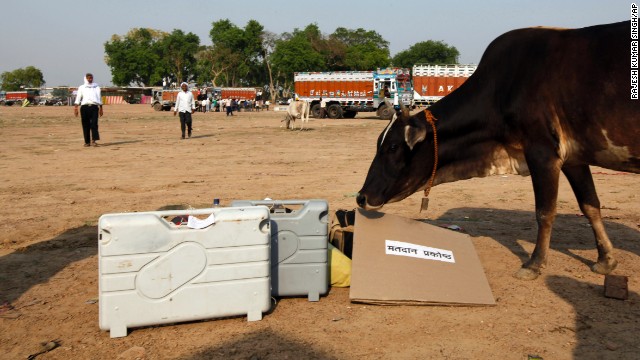 A cow approaches electronic voting machines in Allahabad on May 6.
A cow approaches electronic voting machines in Allahabad on May 6.  Supporters of the Communist Party of India (Marxist) walk with party flags during an election campaign in Kolkata on Sunday, May 4.
Supporters of the Communist Party of India (Marxist) walk with party flags during an election campaign in Kolkata on Sunday, May 4.  Women and children attend an election rally in Amethi, India, on Saturday, May 3.
Women and children attend an election rally in Amethi, India, on Saturday, May 3. 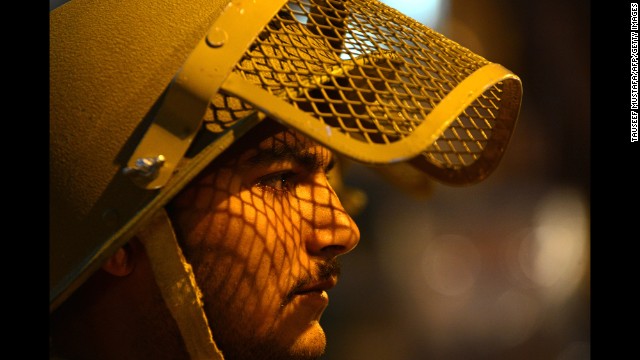 A police officer patrols during curfew in the Maisuma locality of Srinagar, India, on Friday, May 2.
A police officer patrols during curfew in the Maisuma locality of Srinagar, India, on Friday, May 2.  A Kashmiri Muslim woman confronts Indian police after they arrested a youth during a protest in Srinagar on May 2.
A Kashmiri Muslim woman confronts Indian police after they arrested a youth during a protest in Srinagar on May 2.  An Indian soldier stands in the middle of an empty Srinagar street Wednesday, April 30, following calls by rebels and separatist politicians to boycott the parliamentary elections.
An Indian soldier stands in the middle of an empty Srinagar street Wednesday, April 30, following calls by rebels and separatist politicians to boycott the parliamentary elections.  A soldier helps voters locate their polling station in the village of Sultanwind, near Amritsar, India, on April 30.
A soldier helps voters locate their polling station in the village of Sultanwind, near Amritsar, India, on April 30.  Election officials distribute electronic voting machines and other material to polling officials in Howrah, India, on Tuesday, April 29.
Election officials distribute electronic voting machines and other material to polling officials in Howrah, India, on Tuesday, April 29.  Police conduct a security check Monday, April 28, before voting in Srinagar.
Police conduct a security check Monday, April 28, before voting in Srinagar.  A supporter listens to Bahujan Samaj Party leader Mayawati during an election rally in Allahabad on Sunday, April 27.
A supporter listens to Bahujan Samaj Party leader Mayawati during an election rally in Allahabad on Sunday, April 27.  Kashmiri Muslims watch from a window as an Indian paramilitary soldier stands guard near the site of an explosion near the venue where an election campaign rally was to take place in downtown Srinagar on April 27.
Kashmiri Muslims watch from a window as an Indian paramilitary soldier stands guard near the site of an explosion near the venue where an election campaign rally was to take place in downtown Srinagar on April 27. 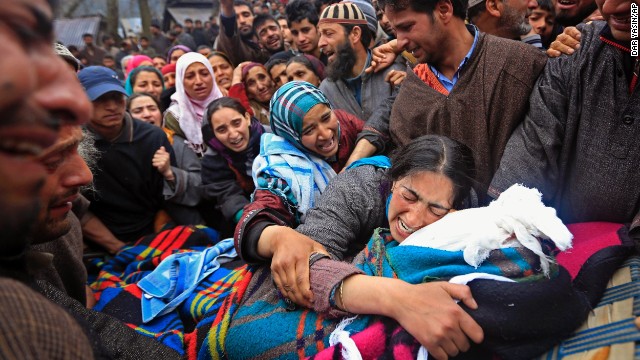 Sumaira Wani, wife of Zia-Ul-Haq, mourns by the body of her husband during his funeral in Hirpora, some 65 kilometers (40 miles) north of Srinagar on Friday, April 25. Zia, an Indian poll official, was killed soon after voting in the ongoing election, when suspected rebels fatally shot him and wounded four others in an attack on a bus in the Indian-controlled portion of Kashmir.
Sumaira Wani, wife of Zia-Ul-Haq, mourns by the body of her husband during his funeral in Hirpora, some 65 kilometers (40 miles) north of Srinagar on Friday, April 25. Zia, an Indian poll official, was killed soon after voting in the ongoing election, when suspected rebels fatally shot him and wounded four others in an attack on a bus in the Indian-controlled portion of Kashmir. 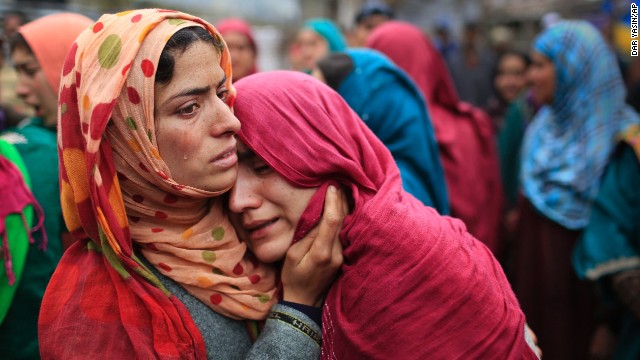 Unidentified relatives cry during the funeral procession of Zia-Ul-Haq in Hirpora on April 25.
Unidentified relatives cry during the funeral procession of Zia-Ul-Haq in Hirpora on April 25.  An Indian Punjab State Police officer stands in front of a picture of Bharatiya Janata Party leader Narendra Modi and Punjab Chief Minister Parkash Singh Badal during an election rally by the two men April 25 in Bathinda, India.
An Indian Punjab State Police officer stands in front of a picture of Bharatiya Janata Party leader Narendra Modi and Punjab Chief Minister Parkash Singh Badal during an election rally by the two men April 25 in Bathinda, India.  Indian women cast their vote at a village near Sawai Madhopur, India, on Thursday, April 24.
Indian women cast their vote at a village near Sawai Madhopur, India, on Thursday, April 24.  An Indian woman gives her thumb impression before casting her vote in a village near Sawai Madhopur on April 24.
An Indian woman gives her thumb impression before casting her vote in a village near Sawai Madhopur on April 24.  A polling official carries electronic voting machines at a distribution center in Gauhati, India, on Wednesday, April 23.
A polling official carries electronic voting machines at a distribution center in Gauhati, India, on Wednesday, April 23.  A woman casts her vote on the outskirts of Jaipur, India, on Thursday, April 17.
A woman casts her vote on the outskirts of Jaipur, India, on Thursday, April 17.  An elderly man casts his vote inside a polling station in Amroha, India, on April 17.
An elderly man casts his vote inside a polling station in Amroha, India, on April 17.  A supporter of the Peoples Democratic Party shouts slogans during an election campaign rally on the outskirts of Srinagar on April 17. Several separatist organizations have jointly appealed to the people of Jammu and Kashmir to boycott the Indian parliamentary elections.
A supporter of the Peoples Democratic Party shouts slogans during an election campaign rally on the outskirts of Srinagar on April 17. Several separatist organizations have jointly appealed to the people of Jammu and Kashmir to boycott the Indian parliamentary elections.  A helicopter carrying Nagma, a Bollywood actress and Congress Party candidate from Meerut, takes off after an election rally on April 17.
A helicopter carrying Nagma, a Bollywood actress and Congress Party candidate from Meerut, takes off after an election rally on April 17. 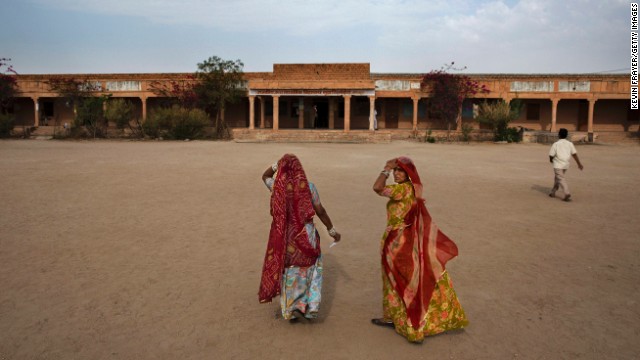 Women arrive to vote at a polling station on April 17, in the desert state of Rajasthan.
Women arrive to vote at a polling station on April 17, in the desert state of Rajasthan.  People stand in line to cast their votes in Jaipur on April 17.
People stand in line to cast their votes in Jaipur on April 17.  A voter casts her ballot at a polling booth in Doda, India, on April 17.
A voter casts her ballot at a polling booth in Doda, India, on April 17.  An Indian election official marks the finger of a voter with ink before she casts her ballot in Sambhar, India, on April 17.
An Indian election official marks the finger of a voter with ink before she casts her ballot in Sambhar, India, on April 17. 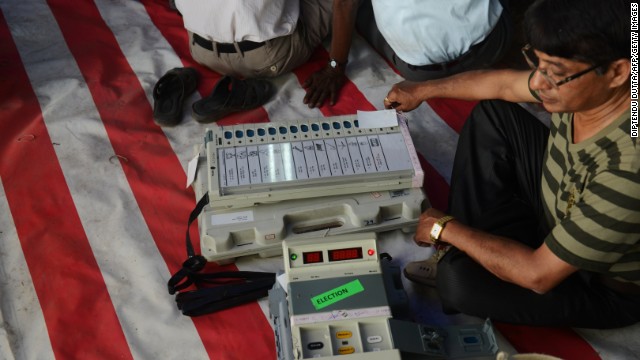 An election official checks an electronic voting machine before taking it to polling stations at a distribution center in Siliguri, India, on Wednesday, April 16.
An election official checks an electronic voting machine before taking it to polling stations at a distribution center in Siliguri, India, on Wednesday, April 16.  An election official carries an electronic voting machine across a makeshift bridge after picking it up from a distribution center in Doda on April 16.
An election official carries an electronic voting machine across a makeshift bridge after picking it up from a distribution center in Doda on April 16. 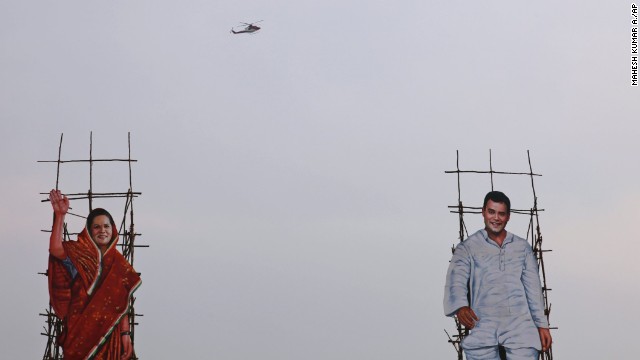 Portraits of Congress Party President Sonia Gandhi, left, and Vice President Rahul Gandhi are seen at an election rally in Karimnagar, India, on April 16.
Portraits of Congress Party President Sonia Gandhi, left, and Vice President Rahul Gandhi are seen at an election rally in Karimnagar, India, on April 16.  Security personnel load their luggage on a bus as they leave for various polling centers in Udhampur, India, on Tuesday, April 15.
Security personnel load their luggage on a bus as they leave for various polling centers in Udhampur, India, on Tuesday, April 15.  A young girl watches an election campaign rally from her house in Rawalpora, India, on April 15.
A young girl watches an election campaign rally from her house in Rawalpora, India, on April 15.  Supporters of India's main opposition Bharatiya Janata Party dance during a campaign rally in Udhampur on April 15.
Supporters of India's main opposition Bharatiya Janata Party dance during a campaign rally in Udhampur on April 15. 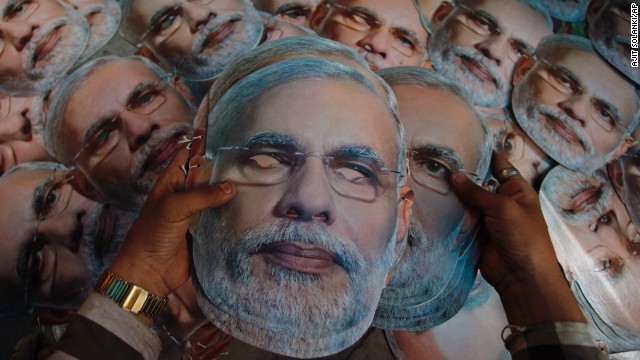 A worker arranges masks of Bharatiya Janata Party candidate Narendra Modi at a printing press in Ahmedabad, India, on Saturday, April 12.
A worker arranges masks of Bharatiya Janata Party candidate Narendra Modi at a printing press in Ahmedabad, India, on Saturday, April 12.  A woman carries her child and waits for her identity to be checked before voting in Diphu, India, on April 12.
A woman carries her child and waits for her identity to be checked before voting in Diphu, India, on April 12. 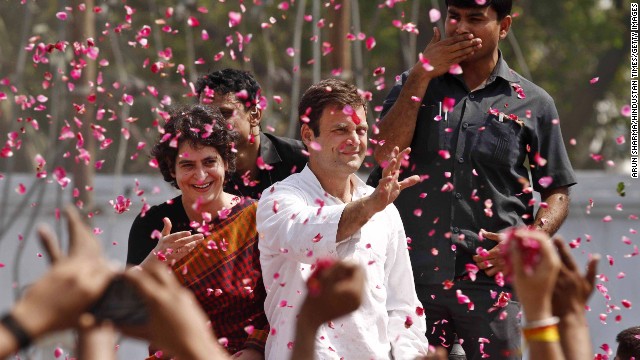 Rahul Gandhi, one of the leading candidates for prime minister, waves to supporters in Amethi, India, as he arrives to file his nomination on April 12.
Rahul Gandhi, one of the leading candidates for prime minister, waves to supporters in Amethi, India, as he arrives to file his nomination on April 12.  Congress Party supporters hold flags as they walk home from a Gandhi rally April 12 in the northern state of Uttar Pradesh.
Congress Party supporters hold flags as they walk home from a Gandhi rally April 12 in the northern state of Uttar Pradesh.  Gaurav Shrinivas Sharma, a climber nicknamed Indian Spiderman, campaigns in Mumbai, India, on Friday, April 11. Sharma is an independent candidate from the South Mumbai constituency.
Gaurav Shrinivas Sharma, a climber nicknamed Indian Spiderman, campaigns in Mumbai, India, on Friday, April 11. Sharma is an independent candidate from the South Mumbai constituency.  People in Doda wave as a helicopter carrying Gandhi leaves after a campaign rally on April 11.
People in Doda wave as a helicopter carrying Gandhi leaves after a campaign rally on April 11.  Indian Muslims wait outside a polling booth to cast their votes on Thursday, April 10.
Indian Muslims wait outside a polling booth to cast their votes on Thursday, April 10.  A paramilitary soldier stands guard inside a room containing ballot boxes on April 10.
A paramilitary soldier stands guard inside a room containing ballot boxes on April 10.  A woman casts her vote in Muzaffarnagar, India, on April 10.
A woman casts her vote in Muzaffarnagar, India, on April 10.  Voters wait for their identities to be verified before casting their ballots April 10 in Haryana, India.
Voters wait for their identities to be verified before casting their ballots April 10 in Haryana, India.  A woman points out her photo before casting her vote in New Delhi on April 10.
A woman points out her photo before casting her vote in New Delhi on April 10.  Jyoti Amge, a first-time voter and the world's shortest woman according to Guinness World Records, gets her finger marked with ink after voting in Nagpur, India, on April 10.
Jyoti Amge, a first-time voter and the world's shortest woman according to Guinness World Records, gets her finger marked with ink after voting in Nagpur, India, on April 10.  A woman is given directions by a polling station officer in Haryana on April 10.
A woman is given directions by a polling station officer in Haryana on April 10.  Voters leave a polling station in Muzaffarnagar on April 10.
Voters leave a polling station in Muzaffarnagar on April 10.  A polling officer checks the number of an electronic voting machine after it was deposited in Senapati, India, on Wednesday, April 9.
A polling officer checks the number of an electronic voting machine after it was deposited in Senapati, India, on Wednesday, April 9.  A polling official marks a voter's finger with ink in Senapati on April 9.
A polling official marks a voter's finger with ink in Senapati on April 9.  An elderly man casts his vote in Manipur, India, on April 9.
An elderly man casts his vote in Manipur, India, on April 9. 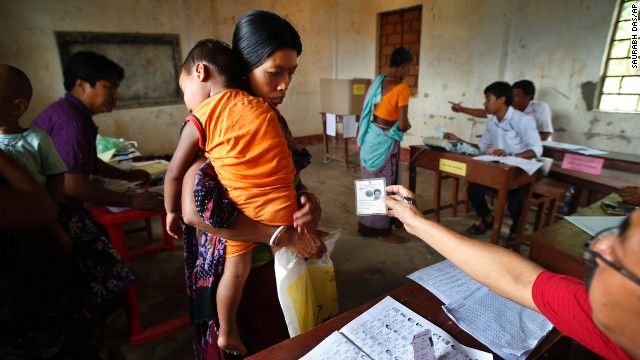 An official checks a voter's identity card in Agartala, India, on Monday, April 7.
An official checks a voter's identity card in Agartala, India, on Monday, April 7.  People wait in lines to cast their votes in Agartala on April 7.
People wait in lines to cast their votes in Agartala on April 7.  An election official checks the identity of a voter on April 7.
An election official checks the identity of a voter on April 7.  A woman with a baby casts her vote inside a polling center at Misamora Sapori, an island in the Brahmaputra River, on April 7.
A woman with a baby casts her vote inside a polling center at Misamora Sapori, an island in the Brahmaputra River, on April 7.  Rahul Gandhi addresses supporters during an election rally in Bangalore, India, on April 7. Gandhi's great-grandfather, grandmother and father have all served as prime minister.
Rahul Gandhi addresses supporters during an election rally in Bangalore, India, on April 7. Gandhi's great-grandfather, grandmother and father have all served as prime minister.  Running against Gandhi is Narendra Modi, chief minister of the western state of Gujarat with a reputation as a tough, "can-do" administrator.
Running against Gandhi is Narendra Modi, chief minister of the western state of Gujarat with a reputation as a tough, "can-do" administrator. 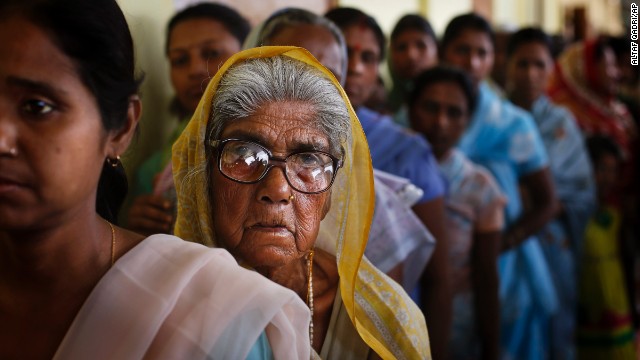 Indians in Dibrugarh stand in a line to cast their vote on April 7.
Indians in Dibrugarh stand in a line to cast their vote on April 7. 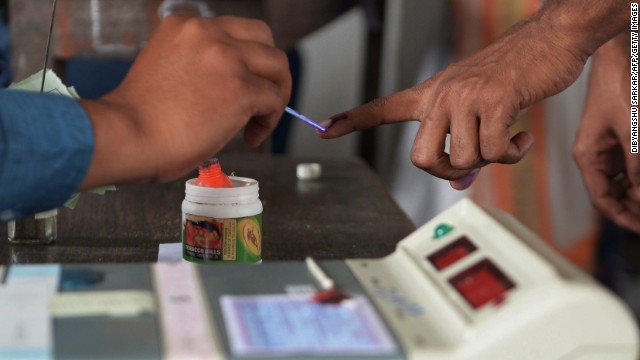 An election officer uses ink to mark a voter's finger at a polling station in Dibrugarh on April 7.
An election officer uses ink to mark a voter's finger at a polling station in Dibrugarh on April 7.  A polling officer in Agartala looks for a voter's name in the registered voter list April 7.
A polling officer in Agartala looks for a voter's name in the registered voter list April 7.  A polling official in Dibrugarh tests an electronic voting machine prior to the start of voting April 7.
A polling official in Dibrugarh tests an electronic voting machine prior to the start of voting April 7.  People wait in line to cast their votes during the first phase of voting in Dibrugarh.
People wait in line to cast their votes during the first phase of voting in Dibrugarh.  Women voters wait outside a polling station in Dibrugarh on April 7.
Women voters wait outside a polling station in Dibrugarh on April 7.
- New Indian Prime Minister Narendra Modi enters office with a big mandate for change
- Ravi Agrawal says Modi will need to move quickly to carry out his economic program
- He should focus on making India more competitive, an easier place to do business
- Agrawal: India's infrastructure is lacking; "birth to death" corruption must be addressed
Editor's note: Ravi Agrawal is CNN's New Delhi Bureau chief and was formerly senior producer of the network's "Fareed Zakaria GPS." Follow him on Twitter: @RaviAgrawalCNN. The opinions expressed in this commentary are solely those of the author.
New Delhi (CNN) -- He hasn't even been sworn in, yet India's next Prime Minister has already changed the world's biggest democracy. Narendra Modi's stunning, crushing victory at the polls this week reverses a trend that was beginning to define India -- the localization of politics.
Since independence in 1947, with each passing year there have been new and increasingly influential regional parties catering to local interests, cultures, languages, beliefs, castes, religions. The result has been a steady dilution of power: in three decades, no single party has been able to form a national government on its own. Instead, New Delhi witnessed the formation of a series of coalitions, sometimes beholden to the whims of fringe members.
That trend has now been destroyed. Indians -- be they Bengali or Gujarati, urban or rural, young or old -- have channeled their yearnings for a better-run country into one vision, one man, and one party. Narendra Modi's Bharatiya Janata Party (BJP) now has a resounding mandate to make clear, single-minded decisions. There are indeed hurdles to legislation -- for example, the BJP is not well-represented in the country's upper house of parliament -- but such is the force of the Modi wave right now, few would want to get in the way.
In recent years, the India story has soured; as I've written previously, Indians have bought into Modi's rhetoric of being someone who can turn things around. So, what are the big issues Modi's team need to deliver on?
Here are three ways the new Prime Minister can address the things holding back India Inc.
Bring the nation's infrastructure into the 21st century: Given India's ambitions, and all the talk of India as a global power, consider where the country actually stands. According to the World Economic Forum's Annual Report on Competitiveness, India ranks 85th in the world for basic infrastructure like roads and public services. On technological readiness, India -- the world's so-called I.T. back-office -- ranks 98th.
On softer infrastructural issues like education and health, India ranks 102nd in the world. Indians have cast their votes this year demanding to see tangible improvements. For example, India has world-class ports; but its roads are so poor that transporting goods becomes prohibitively expensive. Or consider food: One-third of all food produced in India is spoiled and rendered useless before it reaches a consumer. India's supply-chain mechanisms are blighted by a lack of infrastructure and a system of middle men who delay delivery and force up prices.
Modi will need to use a lot of political capital to clean up these systems. Some of these could be done quickly; some will take decades. Modi will need clear visions for short and long-term goals, perhaps involving the private sector to find solutions.
 The controversy behind India's next PM
The controversy behind India's next PM  Fareed's Take: India-U.S. relationship
Fareed's Take: India-U.S. relationship  W.H.: Modi welcome in the United States
W.H.: Modi welcome in the United States Make it easier to do business in India: Ask any investor anywhere in the world about working in India and you'll hear a familiar sigh. Few countries impose as many restrictions and hurdles, and almost none require as many permits, permissions, and bribes to start a business. As I wrote earlier this week, the World Bank ranks India 134th in the world for ease of doing business.
It's a shocking label to carry, especially for a nation of India's lofty aspirations. One of Modi's greatest selling points has been his track record and energy in processing requests for new ventures; he has flung open his home state's doors to big business. Modi will be expected to do the same on a national scale. It seems like a logical progression, but adapting to the scale and diversity of this country will be a challenge.
In Gujarat he kept some of the most important portfolios all to himself: home, industry, information, ports, general administration, science and technology, and climate change. Put simply, he hoarded power. This will be next to impossible to do at the national level, at least not to the same extent.
Modi will need to pick his deputies well, and learn to delegate. He will need to quickly appreciate the diversity of opinion in India -- even though its people were unified enough to give him an absolute majority. Most of all, he will need to find ways and inducements to bring powerful state leaders on board -- without them, he too will find out why so many businessmen have begun to give up on India Inc.
Clamp down on corruption: The writer Gurcharan Das says that in India one encounters "birth-to-death" corruption: you pay a bribe to get a birth certificate, and you pay another bribe to get a death certificate. Along the way, life becomes a long series of bribe-taking and bribe-giving -- everyone is complicit.
Quite simply, Modi will need to clamp down brutally on corruption, even if it means outing a few skeletons in his own party's closets. Momentum is key here. Modi could probably derive some inspiration from China under President Xi Jinping, which has been on a ruthless drive to out corrupt leaders. But the impacts of corruption in India permeate far deeper than they do in China.
It is said that India's "informal" sector generates half of the nation's GDP, and accounts for nine-tenths of its jobs. What this means is that much of India's real income is not properly accounted for.
For all his rhetoric about small government, Modi will need to find a way to expand the government's coffers if he wants to fund big infrastructural projects. Consider this: only 3% of Indians are eligible to pay income taxes. Of the ones who are eligible, many find loopholes to exploit. This will be a difficult culture to change.
Part of Modi's challenge will be to make a case for why his decisions will be beneficial in the long term, even if they cause pain right now. Certain subsidies -- such as those for diesel and kerosene -- will need to be slashed. The BJP's supporters will balk. Modi will need to find the courage to stay the course.
One could go on about the many big-ticket issues Modi will need to tackle: health care, foreign policy -- not least relations with the United States -- education, jobs, defense, but the ones I elaborate on above are the ones Modi has been talking about the most -- and those are the ones he will be judged on in his first 100 days in office.
One caveat: Checks and balances may seem like hindrances, but overall, they are vital to the security of people. Even with his undisputed mandate, Modi will encounter all kinds of checks -- on religious freedoms, on the judiciary, on constitutional rights, on human rights.
On all these issues he will need to display patience and appreciation of the system, and a compassion and deftness of touch he has often failed to display in his home state. Perhaps that will be his biggest internal challenge: to be strong, and yet be willing to appreciate the importance of dissent in a healthy democracy. Indians will give him a lot of time to adjust -- but not forever.
Follow @CNNOpinion on Twitter.
Join us on Facebook/CNNOpinion.
No comments:
Post a Comment